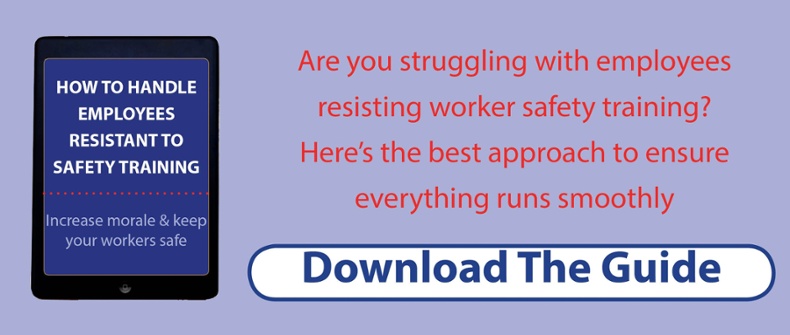
In modern businesses it's inevitable that resources must be split across multiple areas in large teams. Teamwork often includes lone/ mobile workers, whether operating machinery in the manufacturing industry or writing up an office assignment at home, whose contribution is vital to the successful running of the business overall. For this reason each person's individual needs must be considered and met. This can be one of the biggest challenges for teams that could number up to 200 or more individuals, especially if you try to tackle the issues all at once. That may seem a little overwhelming at first. Rather, it's preferable to break down these challenges and aim to tackle them each in the best way possible as they arise. So here are the top 10 most common challenges faced by mobile workers, and how to manage them effectively.
Safety concerns
It may seem the most obvious and pressing concern, but employers can never afford to treat the issue of safety complacently. Whether it's something as simple as working a lone shift in the supermarket, or operating a high impact piece of machinery, the policy of 'safety first' is always the best one. Ensure there are safety measures in place for when your employee needs help - if it's not possible for them to call, then there will need to be other procedures in place. This is vital not only for the safety of the individual themselves, but for the well-being of the company. You can be sure, if someone has a bad injury at work and lawyers get involved, the end result may not be pleasant as it pertains to either the company's reputation or their financial pockets. It's advisable that a lone worker policy is adhered to, which assesses risks and details how workers can be protected. By having the appropriate safety measures in place, legal trouble can at least be navigated in more confidence than if you'd been unprepared for the eventuality - and hopefully avoided altogether. For more specific advice on how to ensure lone worker safety and prevent accidents, click here.
Threat of violence
Similar to the above point - mobile workers may be more susceptible to violence, for example those working alone in a shop where threats may often emerge without warning. Ensure that the risk of violence is assessed and be ready to implement measures that reduce its threat.
Good equipment
Ideally all employees should have the best equipment to work with. This is especially true of those who work in isolation and may not immediately be able to call on others for help when things go wrong.
Comfort
As an employer or supervisor you'll want to make sure the employee is comfortable in their role, or at least aware of its challenges if it's one that may lead to some unavoidable discomfort. In that case there are still measures that can be taken to ease the potential strain of the job. As they're likely to be working in isolation and unable to ask for help when they might need it, you should ensure there is some capacity in which they are free to take a comfort break. Though at the same time, you don't want this going too far in the other direction; for them to get too comfortable without supervision, which leads directly onto the next point.
Accountability issues
It will be tempting for some individuals to think they can afford to slack off work if they're often operating without supervision. Worse, there are situations in which they may attempt to steal from the company if they begin to feel no one is watching. Of course, you can't start treating everyone with abnormally heightened levels of suspicion - you need to have some level of trust for who you're working alongside. Instead, think of this partly as a reminder of why supervision exists in the first place. Good supervision, which doesn't involve looking constantly over someone's shoulder but checking up on them occasionally and letting them know you're not too far away, will help provide accountability to lone workers. Knowing they'll need to report their work progress to someone at some point, or that it will directly impact on the company overall, is an excellent motivating factor for good work done in isolation.
Loneliness
Perhaps a less obvious concern, but an employee's mental health is something that needs to be taken into consideration. Often isolation in a job role can lead to days of loneliness and a loss of fulfilment from work. This in turn will affect their work performance, so it isn't something that can afford to be ignored, either morally or practically. Ensuring employees are as happy as possible at work goes hand in hand with looking after their physical safety. A simple way to combat this is allowing them to listen to music or a podcast through headphones while they work, as this can help them feel like they have some company.
Delegation
Knowing what an individual should or should not be doing alone is important. Some manual tasks may be too dangerous to perform without help. It doesn't take much for an individual to get themselves into trouble around dangerous chemicals or electricity. Carry out risk assessments and safety checks beforehand; know when working alone may not be the best option, or at least provide regular monitoring in uncertain situations.
Fatigue (e.g. Drivers)
Tiredness is a concern for lone drivers particularly, though it may also be a concern in other roles. It's not only their own safety you have to worry about, but the well-being of others around them on the road. Regular breaks are necessary and should be monitored to ensure drivers aren't overworking themselves under pressure. Also ensure their vehicles are well-maintained to high standards, to reduce the risk of breaking down in isolated locations.
Communication
This is the key to many of the points above. Good communication can prevent numerous problems arising in mobile working situations and it's best to reinforce this aspect as much as possible between worker and employer.
Forward planning
Of course, there's no substitute for good forward planning. Often this can be the difference between productive lone working, and misplaced or wasted resources. Make sure each project undertaken in isolation is well understood by those performing the task, and your business is more likely to flourish overall.





